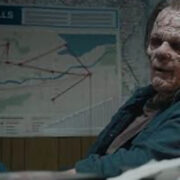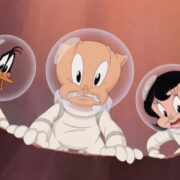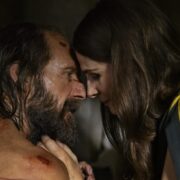ANNETTE: Sympathy For The Abyss
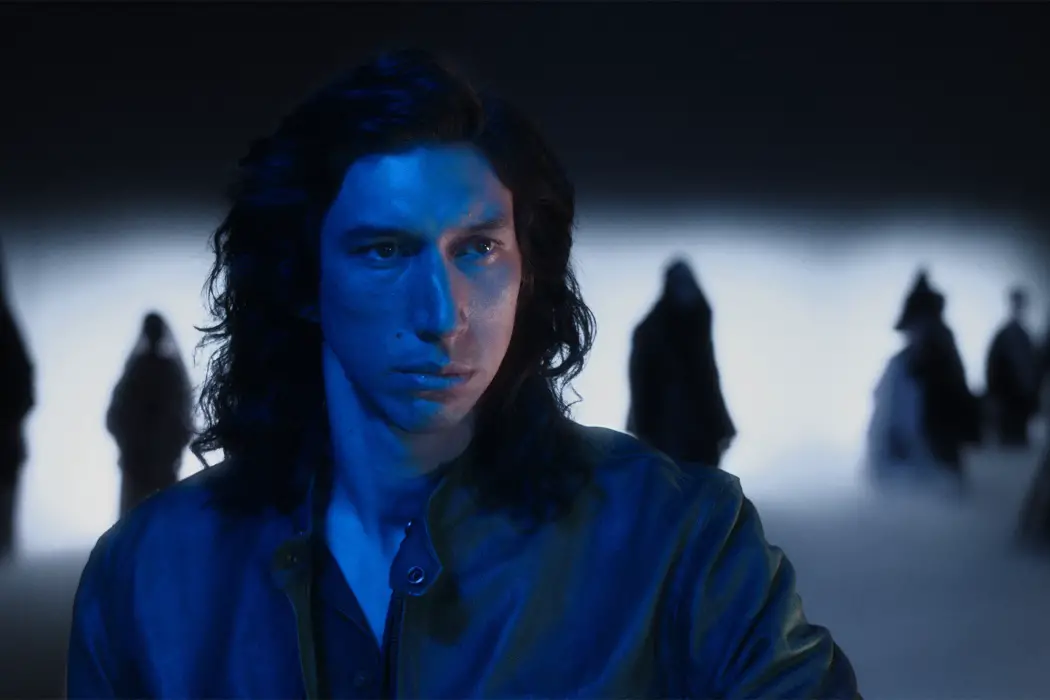
Lee Jutton has directed short films starring a killer toaster,…
Ron and Russell Mael, the enigmatic oddball brothers better known as Sparks, have been recording music together for more than half a century, yet 2021 might be one of the biggest years of their lengthy careers. First came The Sparks Brothers, the documentary-slash-love letter directed by lifelong superfan Edgar Wright that chronicles how “your favorite band’s favorite band” has continued to reinvent themselves into their seventies. One of the best things about The Sparks Brothers is the way it channels the quirkiness of the titular duo in every aspect of its production, from the bombastic opening anthem announcing the film to the tongue-in-cheek captions on most of the talking heads to the closing scene in which the Maels declare a bunch of unlikely (or are they?) statements about themselves. How better to summarize the tone of the film, and the band themselves, than the moment in which Wright asks the Maels, “Are you a real band?” to which Ron Mael firmly responds, “Next question.”
And yet, The Sparks Brothers might not even be the most Sparks-like movie to be released in the summer of 2021. That honor, in my opinion, belongs to Annette, the wackadoodle rock opera written by Sparks and directed by Leos Carax (Holy Motors). Starring Adam Driver as a cynical stand-up comedian with a gift for self-sabotage and Marion Cotillard as the renowned opera singer who tries to show him he can in fact be loved, if he’d only just allow it, Annette was set to be a Sparks album and tour until the Maels met Carax and embraced the opportunity to turn their lifelong dream of making a movie into a reality. The result is intense, amusing, emotional, odd, and oftentimes incredibly bleak — so in other words, quintessentially Sparks. Whether or not that’s something you find appealing is entirely up to you.
We Love Each Other So Much
The opening sequence of Annette, in which Carax (as producer) and Sparks (as band) prepare to record a song fittingly titled “So May We Start” before spilling out of the studio into the street to be joined by the cast, is one of those incredibly special scenes that reminds you how magical the cinema can be. As Driver, Cotillard, and company join the Maels to provide a brief musical introduction into what we can expect from the movie (“We’ve fashioned a world, a world built just for you/A tale of songs and fury with no taboo”), one can’t help but wonder why every movie doesn’t make the effort to bring the audience so fully into its universe as it begins, including instructing everyone in the theater to “please, shut up and sit.” The song itself is an infectious, energetic tune that begins with Ron Mael banging on the keyboard and Russell Mael crooning, and perfectly sets the tone for what is to follow — something thrilling and a bit out of left field.
The story spirals outward from there, introducing us to Henry McHenry (Driver), a self-loathing stand-up comedian who prepares for every show by shadow boxing with a cigarette hanging out of his mouth before going on stage to entertain-slash-terrorize his audience. One night, Henry makes an unexpected announcement during his show: he has fallen in love with the acclaimed opera singer Ann Desfranoux (Cotillard). After a whirlwind courtship that surprises nearly everyone on the planet (an entertainment news broadcast dubs them “the Beauty and the Bastard”), the two marry, and Ann gives birth to a daughter who they name Annette.
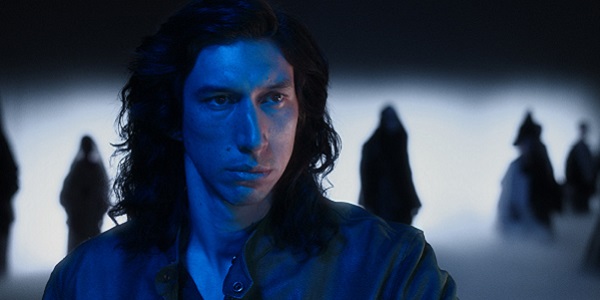
These earlier scenes in Annette, while setting up the powerful relationship that will dominate the rest of the film, are pleasant but leave one wondering where exactly the story is headed; an opposites-attract romance featuring a sweet ballad titled “We Love Each Other So Much” isn’t exactly the wildly original story one would expect from a Sparks-centric musical. But with parenthood, the harshness of reality begins to seep into Henry and Ann’s fairy-tale romance, and things get a lot more intriguing.
As Ann’s star continues to rise, Henry finds himself at home with Annette, drinking himself into a stupor while thinking about his wife repeatedly “dying and bowing” on stage. And as his inner darkness begins to claw its way back to the surface, Ann has nightmares about women coming forward to accuse Henry of abuse and violence. When Henry goes on stage and announces he has killed his wife before going into a lengthy deadpan routine about him accidentally tickling her to death, the audience finally turns on him; tasteless jokes about himself are one thing, but to do the same to Ann is to have finally crossed the line that Henry has hovered over, smirking and smoking, for his entire career.
Let’s Waltz in the Storm
After tragedy strikes, Henry discovers that Annette has acquired a mysterious ability: when starlight and moonlight shine on her face, she can sing with the voice of her mother. This is not even the most haunting thing about the film’s titular baby; for the vast majority of the film’s two-hour-plus running time, Annette is portrayed by a surprisingly expressive puppet. With visible ankle joints and a wooden complexion, the puppet Annette, fortunately, does not cross into the uncanny valley; if anything, her obviously artificial appearance—complete with round eyes, sticky-out ears, and a mop of fiery ginger hair—somehow makes her more lovable. (That the film’s actors all treat the puppet with the same tenderness that they would a real child definitely helps.) Considering that her father never really sees Annette as a real person, including deciding to monetize his daughter’s beautiful singing despite accusations that he’s exploiting her, it’s a striking creative decision that only adds to the substantial heartbreak that pervades the latter half of the film.
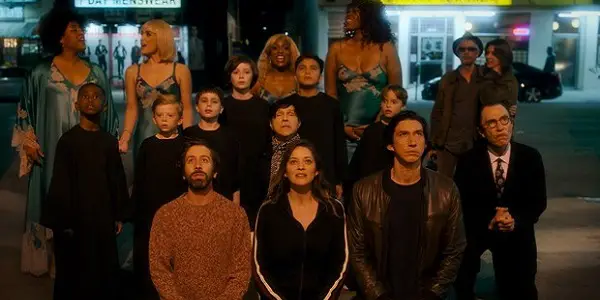
The puppet baby is not the only remarkable visual aspect of Annette. The film’s hyper-specific color palette, including the association of the deep emerald green of envy with Henry and the bright yellow of joy with Ann, tells us more about the characters than any amount of spoken dialogue ever could. (And that’s good because there is next to no spoken dialogue in Annette.) The opera sequences are staged with all of the majesty and melodrama that one would expect, and those stylized visuals often carry over into Ann and Henry’s real-world; in one particularly intense scene, Henry rides his motorcycle to a gig while images of his wife’s various onstage deaths are superimposed over his face, reflecting the recurring topic of his inner torture.
Many of the film’s most powerful scenes take place at night, under the cover of darkness with minimal illumination—another fitting visual representation of Henry’s anguish, courtesy of master cinematographer Caroline Champetier (who previously collaborated with Carax on Holy Motors). For indeed, while the title may be Annette, the film is really about Henry, and his inability to love and be loved without succumbing to self-destruction. Is it uplifting? Absolutely not. But it is compelling. And as Henry watches his baby daughter sing in the moonlight while mist swirls around him in the aftermath of a torrid storm, it’s hard to think of a more beautiful image to grace the big screen this year.
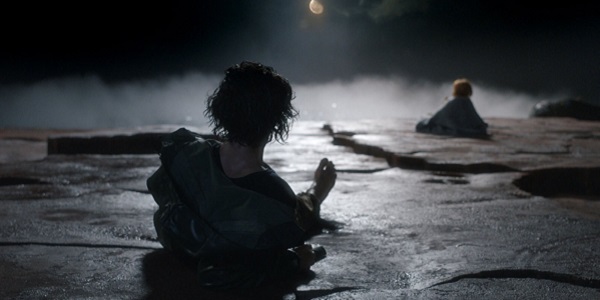
Driver is credited as a producer as well as the star of Annette and has been attached to the project for years as a revolving door of prospective leading ladies who cycled in and out. His personal investment in the project is clear in every facet of his performance, which for my money is the best in his already impressive career. With his unique physicality and ability to convey intense darkness with the twitch of a lip, Driver is an actor made for movies like this, movies willing to make the most of his strange yet undeniably special screen presence. The character of Henry is never really likable at any point in the film, yet Driver ensures that even if you are incapable of sympathizing with him, you at least understand him. Meanwhile, Cotillard is a more than capable foil for Driver, bringing endless charm to the role of Ann; together, they have enough chemistry to make their love story believable to the audience, if not the other characters in the film.
The singing done by Driver, Cotillard, and the other main characters in Annette, including Simon Helberg in a supporting role as Ann’s former accompanist, is not exactly what you would expect to hear belted out on Broadway, but it suits their characters and the style of music in the film well enough. (In the opera sequences, soprano Catherine Trottmann takes over singing duties for Cotillard.) In most movie musicals, it irks me when actors are cast more for their Hollywood name recognition than their singing ability, but here, it’s much better to have someone like Driver, whose singing is serviceable and still conveys a substantial amount of emotion, than someone whose range as a vocalist is greater than their range as an actor. The songs, which range from arias to arena rock to even an ode to childbirth with doctors and nurses chanting “breathe in breathe out breathe in,” all push the narrative of Annette forward while still being awesome to listen to on their own. And with Sparks singing backup on the vast majority of the tracks, it’s all too easy to be carried away by the melodies as one might be on the waves of the sea.
Conclusion
Leos Carax was honored with Best Director at this year’s Cannes Film Festival for his work on Annette; the award was accepted on his behalf by Ron and Russell Mael. There’s no better symbol of how important the visions of both of these idiosyncratic artists are to the totality of Annette. Like many of the previous works of both Sparks and Carax, not everyone will be won over by its weirdness, but those who are will absolutely love it.
What do you think? Are you familiar with the music of Sparks? Share your thoughts in the comments below.
Annette was released in theaters in the U.S. on August 6, 2021, and will be released in the UK on September 3, 2021. You can find more international release dates here.
Watch Annette
Does content like this matter to you?
Become a Member and support film journalism. Unlock access to all of Film Inquiry`s great articles. Join a community of like-minded readers who are passionate about cinema - get access to our private members Network, give back to independent filmmakers, and more.
Lee Jutton has directed short films starring a killer toaster, a killer Christmas tree, and a not-killer leopard. Her writing has appeared in publications such as Film School Rejects, Bitch: A Feminist Response to Pop Culture, Bitch Flicks, TV Fanatic, and Just Press Play. When not watching, making, or writing about films, she can usually be found on Twitter obsessing over soccer, BTS, and her cat.




